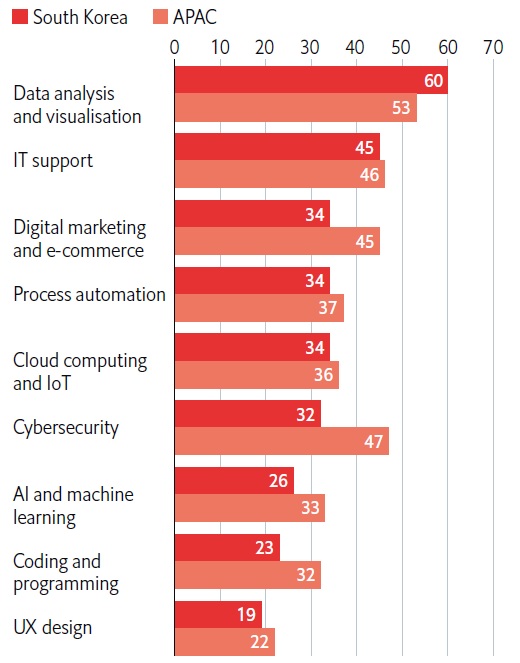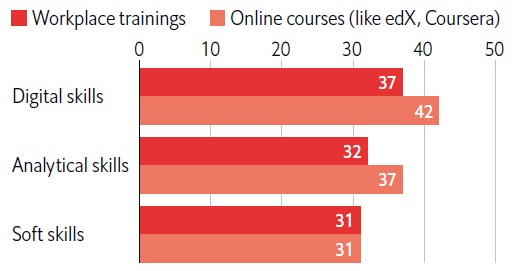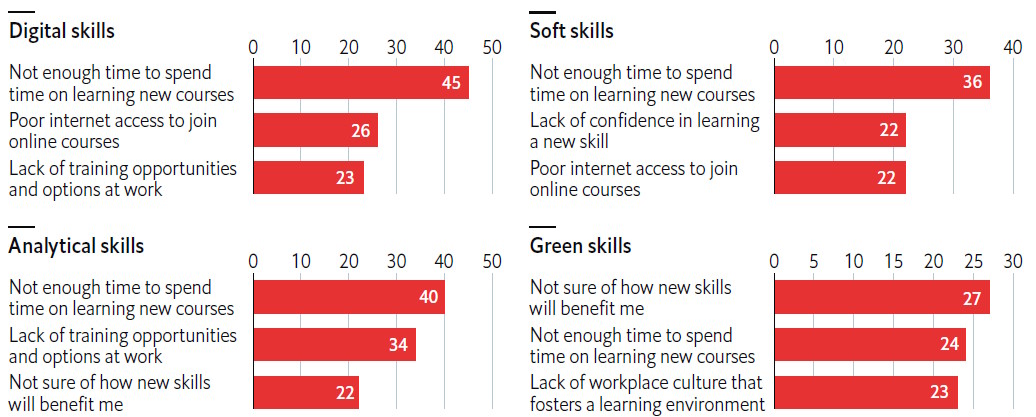The survey respondents were drawn from across 14 markets in the region, out of which 11.8% were Gen Z (born in 1997-2012), 63.2% were Millennials (1981-96) and 25% were Gen X (1965-80). They all worked in a diverse mix of industries.1
The research shows that across the region, common understanding is lacking between employers and employees about future skills and the best way to develop them. In some instances, there is also a mismatch between what employers want and the capabilities that employees possess. Understanding these gaps will be instrumental in creating a workforce that is prepared for the economy of the future.
This article—one in a series of 12 market reports—examines these issues in South Korea. This series complements a research paper that looks at the reskilling and upskilling imperative across APAC.
Key findings
- Self-management and digital skills are key priorities for 58% and 53% of employees in South Korea respectively. In particular, basic digital skills (69.8%), data analysis and visualisation (60.4%) and IT support (45.3%) are considered “must haves” by respondents.
- Over half (58%) of employees in the country report that upskilling or reskilling has encouraged them to explore new roles and areas of interest and 51% cited improved performance in their current job roles.
- Both the government and employers have an important yet distinct role to play in upskilling workers in South Korea. The government is considered most responsible for providing notable recognition such as certificates (45%) and creating access to diversified skills programmes (38%) to support learning. Meanwhile, respondents hold employers responsible for providing financial incentives for skilling (65%), support for their mental well-being and information on skills needed for different roles (53% each).
Powered by world-class technology and a burgeoning ICT industry, South Korea is a high-income, innovation-based economy.2 The fourth-largest economy in Asia stands to gain US$236bn (KRW307trn) in annual economic value if it can unlock more digital transformation,3 but the shortage of digital skills could be a barrier to achieving this ambition. According to one estimate in March 2022, 10m people (or 37% of the national workforce) were required to be digitally upskilled within the year to cope with the growing demand and competition.4
South Korea’s youth unemployment levels reflect this mismatch between the rising demand for skill sets but a lack of expertise in the labour force. The country’s youth unemployment is higher than the OECD average, with 20.9% of young people not in education, employment, or training.5 6 Some graduates with tertiary education seem to lack market-ready skills.7 Moreover, they spend nine months on average looking for relevant jobs.8 Many don’t find a job related to their skill-set with half of university graduates in the existing market employed in fields unrelated to their education and degrees.9
Changing demographics is another trend that will continue to impact the labour market as South Korea has one of the fastest ageing populations in the world.10 In the long term, this trend will directly impact the skills available as the number of workers retiring outpace the younger ones entering the workforce.11 The government has acknowledged this issue and already has an adult learning system in place, and in recent years this has evolved to provide skills for the future economy.12
Strong emphasis on self-management and digital skills
According to the Economist Impact survey, 58% of South Korean employees consider self-management as among the most important skill categories for workforces in their sectors. Nearly 70% of workers from a 2020 survey experienced burnout in the last 12 months13, and the country is known to have the longest work hours amongst the OECD countries, explaining the emphasis on self-management skills which encompass time management, stress tolerance, resilience and flexibility.14
Digital skills are also a major area of focus for 53% of South Korean employees, with basic digital skills considered a must-have by nearly 70% of employees in our survey.15 Within the broader category of digital skills, advanced skills in data analysis and visualisation (60.4%), IT support (45.3%), cloud computing and IoT (34%), process automation (34%) and digital marketing (34%) were also considered must haves by respondents, largely in line with the regional averages. In late 2022, the government said it will invest US$367m (KRW479bn) to nurture one million digital talents by 2026, with a focus on advanced digital skills such as artificial intelligence (AI) and cybersecurity. 16
Figure 1: Data analysis ranks high among must-have skills in South Korea
Which specific types of digital skills are must haves for the workforce in your sector today? (% of respondents)

Source: Economist Impact, 2023
Our survey findings are supported by recent research by employment firm, G-P Meridian Suite, that found high demand for professionals with advanced digital skills.17 In addition to digital skills highlighted in our survey, software development is another popular skillset, says Jae Seong Lee, CEO of Comento Korea. This area is seeing rising salary levels as a result of high demand from businesses.18 In fact, by 2025 South Korean policymakers plan to add 89,000 software professionals to meet the demands from industry, especially small and medium-sized enterprises.19
Green skills are also considered an important category (21%), marginally more than the regional average (17.7%).20 However, Mr Lee says growing interest in green skills is not currently translating into high demand in the country due to a lack of “clarity [from employees] on how to upskill themselves in this area”. However, given the growing importance of the environmental, social and governance agenda, fostering basic green skills among younger workers will be key to accelerating South Korea’s transition towards a more sustainable economy.
Barriers to upskilling, despite high employee motivations
Six in ten (58%) respondents say upskilling and reskilling have encouraged them to explore new roles and areas of interest in their careers, and 51% say it has improved their performance in their current roles. Half (51%) claim learning new skills has helped them increase their confidence and improve their mental health as a result.
This endorsement is reflected in the share of employees acquiring skills through online courses. While the workplace is a key source of digital, analytical and soft skills training, a larger share of survey respondents say they have acquired those skills through online courses.
Figure 2: Online courses and workplace training are important skilling sources
How do you acquire the following skills? (% of respondents)

Source: Economist Impact, 2023
However, not having enough time to learn is the most significant obstacle in acquiring digital skills (45%), analytical skills (40%) and soft skills (36%). Employees in South Korea spend 40 hours a week working with an additional 12 hours overtime on a weekly basis, which is above the OECD average.21
Figure 3: Barriers faced by employees in South Korea to reskill and upskill
What are some of the most significant obstacles that you face while learning new digital, analytical, soft and green skills? (% of respondents)

Source: Economist Impact, 2023
Importance of public-private partnerships
According to the survey results, employees view government and employers as having distinct roles. The government is considered the most responsible for providing notable recognition such as certifications (45%) and for providing access to diversified skills programmes (38%).
Meanwhile, employees hold employers responsible for providing financial incentives for skilling (65%), support for their mental well-being and information on skills needed for different roles (53% each). These are areas that have a tangible and direct impact on employees’ work-life balance, which Mr Lee says is “a crucial factor for people when choosing who to work for”. To encourage more upskilling, employers could explore opportunities to integrate training into workers’ day-to-day routines or mandate training as part of the routine employee management process.
Collaboration between different stakeholders will play an important role in upskilling various segments of the population from young graduates to older employees. The government is already working with the industry as well as universities to ensure that future gaps are accounted for and addressed. In line with its goal of fostering 1m digital workers, the government launched a public-private organisation—the Digital Talent Alliance to collaborate with industry and academia—to meet the rising demand for digital experts which is likely to reach 738,000 by 2026.22 A key aspect of the programme focuses on building the right digital skill sets among young graduates in universities.
Figure 4: Roles of employer and government in supporting upskilling and reskilling
In your opinion, is the government, your employer or you responsible for supporting employees regarding the following issues? (% of respondents)

Source: Economist Impact, 2023
Effective collaboration could also help employees in gaining information on skills in demand. At present, only 35% of employees in South Korea say they currently get information about valuable future skills through events in office and their employers and just 34% cite government awareness programmes. Both the employers and government can work together to provide more information on in-demand skills to close the mismatch that is currently affecting young, unemployed graduates.
Ultimately, collaboration will drive progress by ensuring that stakeholders have clarity on the type of skills in demand and more importantly, translating that information into upskilling the various segments of the workforce.
1 Economist Impact surveyed 100 employees in Korea from 15 industries. The majority of these executives work in the following five industries: manufacturing (17%), retail and wholesale trade (17%), educational services (13%) and professional / business services (10%).
8 Ibid
9 https://keia.org/the-peninsula/low-youth-employment-in-korea-part-1the-golden-ticket-syndrome/#:~:text=Young%20people%20face%20many%20challenges,area%2C%20where%20about%20half%20of
10 https://www.theguardian.com/world/2023/feb/22/south-koreas-birthrate-sinks-to-fresh-record-low-as-population-crisis-deepens
12 https://www.oecd.org/skills/centre-for-skills/OECD-Skills-Strategy-Implementation-Guidance-for-Korea-Report-Summary.pdf
13 https://koreajoongangdaily.joins.com/2020/11/23/business/industry/stress-burnout-satisfaction/20201123200600460.html
14 https://www.economist.com/asia/2021/07/08/south-korean-tech-workers-are-having-a-lousy-time-at-work
15 Basic digital skills in the survey refer to the ability to operate basic office software i.e. Microsoft Office, and set up internet and digital communication tools.
17 https://www.globalization-partners.com/blog/how-technology-can-help-south-korea-based-companies-find-the-best-tech-talent/#gref
20 Green skills are sustainability-related skills or competencies with sustainability-linked areas such as renewable energy, supply chain management, etc.








